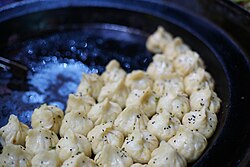Gyōza

Fried jiaozi (煎饺子jianjiaozi)
|
|
| Type | Dumpling |
|---|---|
| Course | Normally as an entree |
| Place of origin | China |
| Region or state | East Asia and worldwide |
| Serving temperature | Hot |
| Main ingredients | Dough, ground meat or vegetables |
| |
|
Jiaozi (Chinese: ![]() Simplified: 饺子 / traditional: 餃子) / (pinyin: jiǎo zi) are a kind of Chinese dumpling, commonly eaten in China and other parts of East Asia. They are one of the major foods eaten during the Chinese New Year and year-round in the northern provinces. Though considered part of Chinese cuisine, jiaozi are popular in other parts of Asia and in Western countries.
Simplified: 饺子 / traditional: 餃子) / (pinyin: jiǎo zi) are a kind of Chinese dumpling, commonly eaten in China and other parts of East Asia. They are one of the major foods eaten during the Chinese New Year and year-round in the northern provinces. Though considered part of Chinese cuisine, jiaozi are popular in other parts of Asia and in Western countries.
Jiaozi typically consist of a ground meat and/or vegetable filling wrapped into a thinly rolled piece of dough, which is then sealed by pressing the edges together or by crimping.
In China, there are several different folk stories explaining the origin of jiaozi and its name.
Traditionally, jiaozi were thought to be invented during the era of the Eastern Han (AD 25 - 220) by Zhang Zhongjing who was a great practitioner of traditional Chinese medicine. Jiaozi were originally referred to as "tender ears" (Chinese: 娇耳; pinyin: jiao'er) because they were used to treat frostbitten ears. Zhang Zhongjing was on his way home during wintertime, when he found many common people had frostbitten ears, because they did not have warm clothes and sufficient food. He treated these poor people by stewing lamb, peppers, and some warming medicines in a pot, chopped them, and used them to fill small dough wrappers. He boiled these dumplings and gave them with the broth to his patients, until the coming of the Chinese New Year. In order to celebrate the New Year as well as recovering from frostbitten ears, people imitated Zhang's recipe to make Jiao'er.
...
Wikipedia
